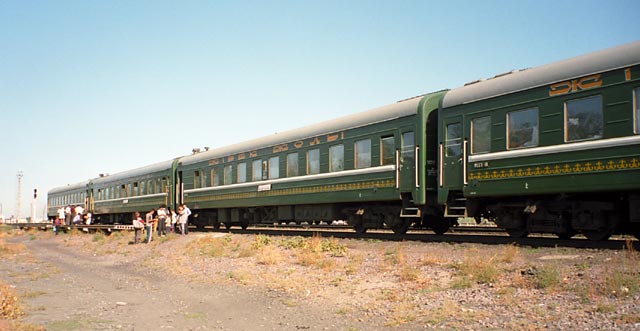
We got up when the train stopped at Aktogay, where the train reversed and started heading east towards the Chinese border. It was quite cool outside. There was no restaurant car on the train, but we were able to concoct our own breakfast of bread, cheese, tomatoes, pears and hot chocolate.
The train was travelling through quite flat countryside, which was very sparsely populated. As we neared the border, mountains rose up on either side of the train, forming a wide, flat valley, and watchtowers dotted the landscape. Currency declaration forms were handed out, leading to yet another money-counting session, and two police officers passed through the train inspecting passports. The same two had checked our passports the previous evening, but this time they decided that something was wrong, and we had to pay a 'fine' of $20 each. Apparently, they wanted to see evidence that our stay in Kazakstan had been registered with the police. We did not have any such evidence, so we had to pay up in order to get our passports back. We asked for receipts, but of course this was not possible - they just wanted to pocket the money.
We arrived at Dostyk (usually referred to by its Russian name of Druzhba - both names mean 'friendship'), the station on the Kazak side of the border, at about 13.30. Here, all passports were collected and taken off the train. The younger of our two bent cops returned to our compartment and offered to share a bottle of Kazak 'konyak' and some scones with us, as a sort of reparation, and we ended up giving toasts to friendship between Britain and Kazakstan. He left us with the remainder of the first bottle and an unopened second bottle, which made us feel a little less bitter about what had happened, but at $100 for two bottles it proved to be rather expensive cognac.
The Chinese railways use the 'standard' gauge of 1435mm (4ft 8½in) whereas the former Soviet Union uses a broad gauge of 1520mm, so the bogies on the train had to be changed. The train was shunted out of the station into the bogie-changing siding, where the carriages were uncoupled from each other and then jacked up, leaving the broad-gauge bogies on the rails. A moving steel rope between the rails is then used both to tow away the broad-gauge bogies and to bring in the standard-gauge ones. Once the standard-gauge bogies are in position, the carriages are lowered onto them and coupled together. When this was complete, the train returned to the station. We stayed on the train during this process, which took about 2 hours and was fascinating to watch.
There was a mad rush for the station toilets when the train arrived back in the platform. The train remained in the station for a further hour, during which the currency declaration forms were collected, and then departed for China, now with a Chinese diesel locomotive pulling us. We were a bit concerned about our passports, as they had not yet been returned to us. There were high-security fences, watchtowers and armed soldiers all over the place, and it was not possible to be certain where the actual border was. The train came to a stand in the middle of nowhere, and remained stationary for a further one and a half hours. During this time, our passports were handed back, and Chinese immigration forms were handed to us. These forms were in Chinese and Russian, so we sat down as a group and began to decipher them, with the aid of a Russian/English dictionary. While we were struggling to do this, the train's piped music system was turned on, and the compartment was filled with the sound of Mary Hopkin's "Those Were The Days". Bizarre.
The train moved away from its stop in no-man's-land and arrived at the Chinese border station, Alashankou, a few minutes later. The station was brightly lit, with flashing coloured lights all over the buildings, and music was playing over the loudspeakers as the train arrived in the platform. A border official came through the train, wheeling a trolley with a portable computer, and entering passport details into it. Five minutes later, another man came along and checked our passports and visas, and collected the immigration forms after entering some details on them himself.
We remained at Alashankou station for three hours, which seemed like an eternity. We didn't want to risk getting off the train, as we didn't know what time the train was due to depart (in fact we didn't even know what time it was in China), so we just sat around getting bored. Bill and Sandra decided that they had had enough, and went to bed, but the rest of us stayed up. When the train eventually pulled away from the station, Brian, Dave and I had a celebratory bottle of Kazak beer and a few shots of Kazak cognac, while watching the lightning flash around the mountains outside. From arriving at the Kazak side of the border to departing on the Chinese side had taken 10 hours.
 |
The Almaty - Ürümqi train at Beskol station, Kazakstan |
We got up at what we thought was about 8 o'clock Beijing Time, expecting to arrive at our destination, Ürümqi, about an hour later. We couldn't identify any of the stations we passed through, as the name boards were only in Chinese and Arabic script. We hadn't reached Ürümqi when we were expecting to, and we still hadn't worked out where we were when we started to approach a large city. The train stopped at a station, and many people got off. We noticed that the station clocks showed 8.45, an hour earlier than our watches. But was that Beijing Time, or the unofficial local time, 2 hours earlier, which many people observe in this area? Should we get off the train? Not everybody had got off, and as far as we knew, Ürümqi was the final destination of the train, so we stayed on, guessing that the station was Ürümqi West.
The train continued towards the centre of the city, over which we could see a layer of pollution. On the hillside to the right of the train was a settlement of mud huts.
The next station was quite clearly Ürümqi's main station, so we got off and met up with our guide outside the station. We were taken by minibus to the City Hotel, and on the journey we managed to clarify what time it was, and pick up some suggestions for things to do in Ürümqi (which is not a lot).
After we had checked in, got showered and got some Chinese money, we went to the Dong Nan Wei noodle bar, which was recommended by Lonely Planet and near the hotel. As the book said, there was no English spoken, but a bit of sign language enabled us to get 5 bowls of spicy noodles and an unlimited quantity of tea. The bill came to 22 Yuan in total, about 40 pence each.
We then walked to Hongshan Park, which is situated on a hill overlooking the city, and spent a fairly leisurely afternoon there. We sat at an outdoor café for some drinks, most of us choosing the 'Future Cola' but Sandra tried the 'Sour Plum', which we all agreed tasted like smoked fish. Most of us also had a go on the circular motor-boats, which were very difficult to control and great fun.
From Hongshan Park we moved on to Renmin (The People's) Park, nearer the centre of the city, and which was decorated with coloured umbrellas. We sat at a teahouse in the park and sipped tea, and I felt as though I could fully relax now, as all the potential difficulties of travel through Central Asia were behind us.
We returned to the hotel, and picked a restaurant from a guidebook for our evening meal. We had chosen the Meisheng Banquet Hall, which offered local specialities, but when we arrived there, we found that it had been booked by a private function. However, the very helpful restaurant manager arranged for one of his staff to take us to another restaurant several blocks away, probably one owned by his brother/uncle/friend or whatever. Anyway, we got a table at this second restaurant, and we were handed the menus - which were in Uyghur (the local language, written in Arabic script) and Chinese only. Brian produced his phrase book, inside which was written a request, in Chinese, for a selection of meat, vegetable and rice dishes. The waiter then had to go and find somebody who could read Chinese, as presumably he could only read Uyghur. We did eventually get a very good meal - at one point it seemed as though they would never stop bringing plates of food to our table. There was also live music and dancing, which made for a real holiday feeling.
Sandra and Brian returned straight to the hotel from the restaurant, while the rest of us had a beer at an outdoor café near the hotel. It was the same unidentifiable local beer as we had drunk at the restaurant. There were a number of groups of men playing Chinese checkers, noisily banging down the wooden discs onto the board.
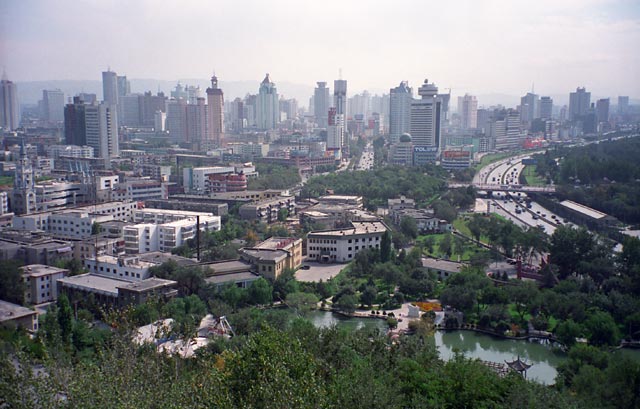 |
View of Ürümqi from Hongshan Park |
The buffet breakfast at the hotel offered some interesting dishes, such as egg, mushrooms and peppers, and green beans with garlic.
We packed our bags and then walked to the Galaxy 169 internet café, with the intention of sending some e-mails home. When we got there, they explained, with the aid of a card printed in English, that no internet connection was available at present. A girl who spoke a little English suggested that we had a drink while we waited, so we all had some green tea. After 20 minutes we decided to give up, as we did not have much time, so we returned to the hotel and checked out.
Bill was not feeling well, and decided to remain at the hotel, where there was quick access to toilet facilities, while the rest of us went shopping for bread, cakes, fruit and drinks, for lunch and for the next train journey.
The minibus arrived to take us to the station, and we were directed to the 'soft class' waiting room. Train 198 left on time at 16.08 for the 52-hour journey to Zhengzhou. The first part of the journey took us through spectacular mountain scenery, with snow-covered mountains on both sides of the train. We were able to open the windows on this train, which was a bonus for photography.
Dave and I ventured to the restaurant car in the evening, but the others preferred to have just a snack in the compartment. The system in most Chinese restaurant cars is that you place your order with the cashier at the table near the entrance, pay, and receive tickets which tell the waiter or waitress what you have ordered. The cashier had a hand-written list of a dozen or so items to choose from - in Chinese. It was a case of either picking something at random, or pointing at food on other people's tables, and this is what we did, much to the amusement of the other customers. We had ordered some meatballs and a spicy meat and vegetable dish, which we had with rice (we had learnt the Chinese for that), all eaten with chopsticks, naturally.
Brian and Sandra joined us in the dining car for a beer, and then we took some bottles back to one of our compartments and drank them while playing Scrabble. We also finished off the Kazak cognac.
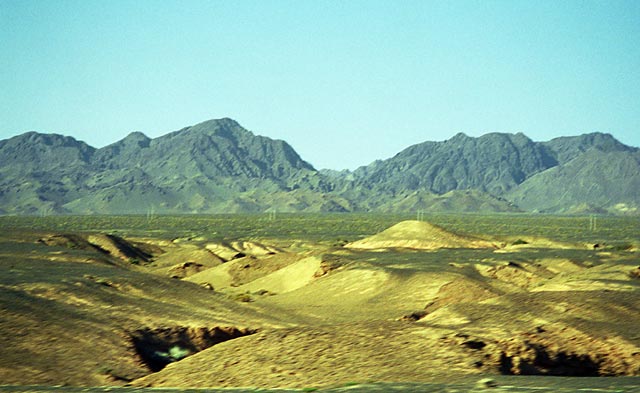 |
View from the train near Turpan, Xinjiang Province |
We briefly went out onto the platform at Shulehe station at about 8 o'clock, to stretch our legs, and then had a snack breakfast. Bill was feeling worse today, and was even heard to vow that he would never again come on a trip like this, and would not take any more photographs. He really must have been ill.
There were still mountains to the south; nearer the railway it was more desert-like. Every so often we would pass factories belching out clouds of smoke from their chimneys - no concerns about the environment here. For our mid-morning snack, Bill produced a packet of stroopwafels (a Dutch wafer biscuit with a chewy toffee middle layer), and I had mine with a cup of hot chocolate. Lekker!
As Dave and I were not suffering from any ill-effects from last night's meal in the restaurant car, all of us except Bill decided to have lunch there. We managed to order Chinese cabbage with chilli, meat with red & green peppers and a large freshwater fish.
I spent the afternoon watching the scenery go by, and listening to a CD. We got out at Zhangye station to watch the locomotive being changed. In the early evening, the mountains closed in on the railway again, providing more good photo opportunities.
For our evening meal in the dining car, which Bill was still not able to face, our sign language managed to produce another fish, celery, and beef with lemon grass. The beer was Guanghe, which had some English phrases on the label: "Best Choice of Modern Drink" and "Guanghe Beer Make Worldwide Friends".
Back in one of our compartments, we finished off the vodka with some pineapple juice. Ominously, Sandra complained of feeling cold and shivery.
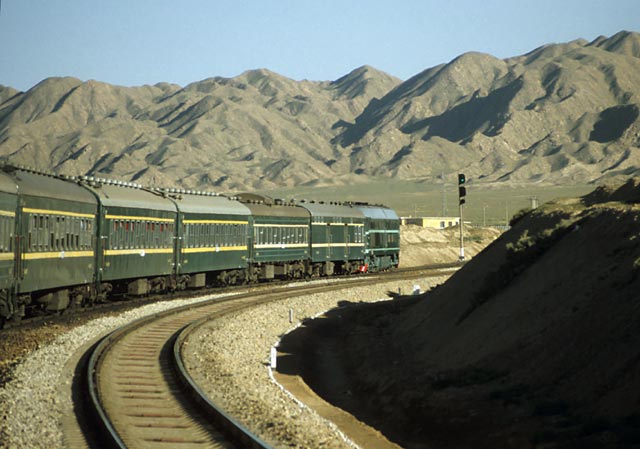 |
The Ürümqi - Zhengzhou train near Yushi, Gansu Province |
We awoke to mists and a much more fertile landscape which was greener than anything we had seen since leaving Moscow. Breakfast was a matter of eating up the food we still had: tinned fruit cocktail, ginger cake, Pringles and coffee.
Sandra was now feeling quite ill, and was sick several times during the morning. Bill was feeling better but he still did not feel up to eating any lunch. Those of us who could face it had a meal of chicken and chilli, pak choy (Chinese cabbage), rice and beer.
The sun finally broke through the mists early in the afternoon, but it became overcast later. It made a change not to have a scorching hot sunny day. The area we were travelling through was now more densely populated, with heavy industry, coal mines and working steam engines. We stepped out onto the platform at Luoyang station, and watched all the activity as dozens of trolleys served hungry passengers. Some sold drinks, sweets and cakes, others served hot tray meals.
Back on board the train, we packed our bags, and the train pulled into Zhengzhou station dead on time at 19.59. We assembled on the platform and our guide came running to meet us (we certainly stood out from the crowd). She was called Kay, and she led us on foot to the Red Coral Hotel, which was almost opposite the station. It was a very luxurious 4-star hotel, with a glass-fronted lift to take us up to our rooms on the 11th floor.
Sandra stayed behind while the rest of us went into the town to look for a restaurant. Zhengzhou is an industrial town and an important railway junction, so there wasn't much of particular interest to tourists. We walked to the February 7th Pagoda, at a major road junction, then down a street which had many stalls cooking and selling hot food. Some of the food actually looked quite appetising, but we thought we should play safe and find a proper restaurant. We returned to the pagoda then walked along Renmin Street for some distance before we came to a restaurant.
We entered the restaurant and were shown to a table. None of the staff spoke any English, but a waiter brought a trolley with dishes of various foods, most of them unidentifiable and not very appetising. We chose some beans, duck, fish and some green, curly things. These were put on our table, cold. We also managed to order some rice, shredded potatoes, bamboo shoots and beer, using a phrase book. We were a bit wary of the cold duck and fish, but the vegetables were good. All the restaurant staff seemed totally amazed at our presence in their restaurant, and we had the feeling that our visit would be talked about for days afterwards.
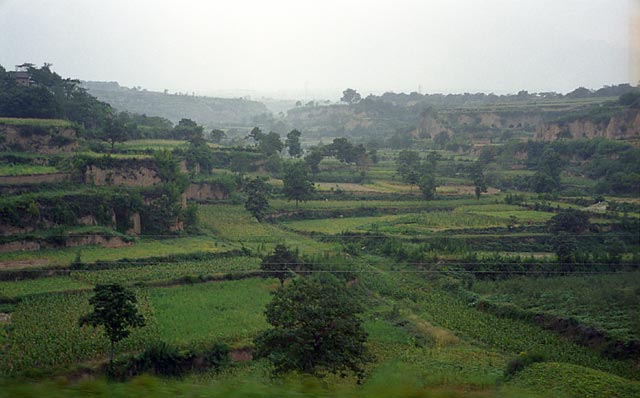 |
View from the train near Tongguan, Shaanxi province |
Another misty morning dawned.
For breakfast, the hotel offered a Chinese buffet with a huge selection of meats, eggs, vegetables, rice, noodles, soup, bread, cakes and all sorts of other things. We could only sample a small selection.
Kay met us at 9 o'clock, and she accompanied us to the station, where we were led into the vast waiting room.
The train, number 543 to Guangzhou (Canton), left at 10.55, and was formed of modern air-conditioned stock. The countryside was very green, and there were many people working in the fields, often with water buffalo. A lady came round with a clipboard, but we were unable to work out what she was asking, so she went.
We went to the restaurant car for lunch, but it was empty and being cleaned. At first we thought we were too late, but by using the phrase book we managed to order some food. We got an excellent meal of squid, shredded pork, duck, shrimps, cabbage, shredded potato, cucumber & mushrooms, with rice, and Aoke beer. The restaurant car suddenly filled up with customers at 13.30, and we reckoned that the lady with the clipboard had been taking bookings for particular times.
We didn't do much in the afternoon. It remained misty outside.
It was getting dark as we crossed the Yangtze (or the Chang Jiang as the Chinese call it) on a massive girder bridge, at Wuhan. We were still too full for another restaurant car meal, so we just ate snacks in the evening. Sandra was now feeling a bit better, and we all went into the restaurant car for some drinks. Sandra and Bill had green tea, while the rest of us drank beer. We played Scrabble, which was of great interest to the other occupants of the restaurant car.
We stepped out onto the platform at Changsha in the late evening, where it was very warm and humid, then got back on board and went to bed.
 |
Lunch on the Zhengzhou - Guangzhou train |
I had had a poor night's sleep, as the train gave rough jolts whenever the brakes were applied. Breakfast was soup and a peach.
Outside, it was warm, humid and misty. Crops growing in the fields included bananas.
We arrived at Guangzhou and were met on the platform by a guide, for transfer to the East station. We had a spacious, air-conditioned minibus for this short transfer - something similar would have been welcome for the longer journeys such as Samarkand to Tashkent. The East station is a new station in the redeveloped business district of Guangzhou, and is used mainly by services to Hong Kong and Shenzhen.
We had lunch at the Kunming Noodle Restaurant. A hand-written menu in English was available, and I chose pork and chilli with noodles. We still had some time to spare so we had a short walk before boarding the minibus to take us to the station.
Although Hong Kong is now part of China, stringent border controls remain, and entry to the 'Special Administrative Region' is restricted. When the passport control opened for the 15.50 train, we passed through, and heard the word 'Alashankou' (the point where we had entered China) uttered a couple of times by the border officials, who were talking to each other in Chinese. This was accompanied by an expression of surprise, or perhaps it was "where the hell is that?"
The train to Hong Kong (Kowloon), was a conventional one, but the on-board magazine showed some trains on this route to be operated by double-deck trains (in fact there was one stood in the adjacent platform) and some to be operated by a streamlined 'high-speed' train. The journey was booked to take one hour and 42 minutes, but we arrived 15 minutes late. Our epic expedition from Moscow was over.
We were all going to take group photos on the station, but we only managed to take one before being stopped, as they don't allow photography on the 'international' platforms. Passport control is carried out again on Kowloon station.
We weighed up the options for buying tickets to take us to our hotel, and decided to buy 'Octopus' cards. These are contactless smart cards which have a stored monetary value (we started off with HK$100 each) and only have to be passed over the sensors at the entry/exit gate for the gate to be opened and the fare for the journey deducted from the card. Our first journey required us to take a Kowloon - Canton Railway (KCR) train to Kowloon Tong, and to change there to the Mass Transit Railway (MTR) to take us to Prince Edward station. From there, we had no problem finding the Concourse Hotel, which we had used in '97.
We decided to repeat our 1997 celebratory meal at Harry Ramsden's fish & chip restaurant. We relied on memory for getting there, taking the MTR to Wan Chai, on Hong Kong Island, from where it was a short walk. A 'Harry's Special' with mushy peas, a pint of Tetley's bitter and a bottle of Hopback 'Summer Lightning' beer, made a very filling meal.
We returned by taking a tram to Central, then the Star Ferry across to Kowloon, and finally the MTR to Prince Edward.
The hotel did a breakfast for HK$88, so we all had that and then headed for the Central shopping district on Hong Kong Island. Most of us bought some CDs at Hong Kong Records in the Pacific Place shopping centre, as we had done in 1997, although the savings were not as great now. We had lunch at a café called EAT, where I had fruit juice and sushi.
We had arranged this afternoon to meet up with Jane, a friend of Bill's from the village near Cheltenham where he used to live, and who was now working in Hong Kong. She took us for a walk in the 'mid-levels', part way up the hillside overlooking the Central district and the harbour. When we reached the bottom again, Jane left us and we walked on to the new Airport Express railway station, where we were able to reconfirm our flights home. We also went to the Outlying Islands ferry terminal, to check the times of ferries to Cheung Chau, the island we were planning to visit tomorrow.
We returned to the International Finance Centre (IFC), which is also a shopping centre, above the station, and came across the Pacific Coffee Company café, which offers free internet access to customers (as do many places in Hong Kong). I had a hot chocolate (Sandra had a strange guava drink which she didn't like), and eventually a terminal became free, and I was able to send an e-mail on behalf of the group to a long list of addressees.
We decided to stay in the IFC for our evening meal, which we had at Spaghetti House. I had soup and a pizza, and we shared a pitcher of San Miguel beer.
 |
Dave, Sandra, me, Brian and Bill |
After breakfast at the hotel, we went by MTR to Central to catch the 10.15 ferry to Cheung Chau, one of the smaller inhabited islands. We used our Octopus cards to pay for the ferry, and the journey took 45 minutes.
The island has a small town, with no high-rise buildings and no cars. We walked from the harbour, through the town and along the coastal path, which led us via a Buddhist temple to a secluded, sandy bay, known as the Italian Beach. A young couple were the only other occupants of the beach, and were probably hoping to have the place to themselves, so they soon left after the five of us arrived.
We spent a few hours on the beach, or in the sea. The sand was uncomfortably hot to walk on barefoot. The sea was lovely and warm, but there were some sharp rocks under the water so sandals were necessary while paddling out into deeper water. I was wearing a wide-brimmed hat to protect my head from the sun (I must have looked ridiculous swimming in it) but my back and shoulders got badly sunburnt.
When we realised that our previously pale, white bodies had turned bright red, we left the beach and walked back to the harbour on another footpath, which took us via the island's cemetery. We just caught the 15.45 high-speed ferry to Central, and returned to the hotel.
In the evening, Bill and I attended a reception for the Institution of Railway Signal Engineers' annual convention. When that was over, the five of us met up again and went to an Australian restaurant in the Central district. It was quite expensive, but we decided to push the boat out as it would be our last meal together. I had mushroom, spinach and feta strudel as my starter, barramundi (fish) as main course, and finished the meal with a pecan and banana tart. All courses were very tasty and well presented, and the two bottles of Australian wine were excellent.
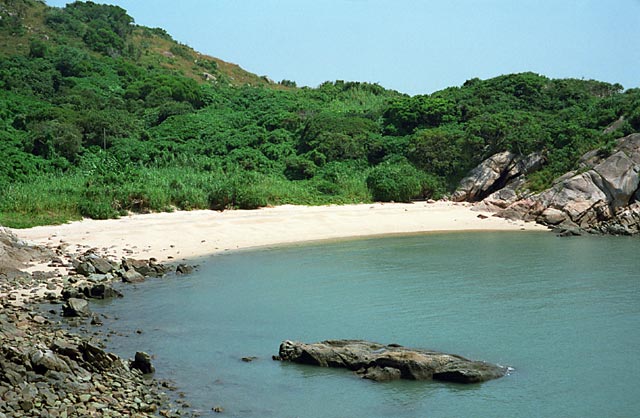 |
The 'Italian Beach' on Cheung Chau island |
Over the next four days Bill and I attended the IRSE annual convention, with technical visits to the KCR, MTR, the new Airport Express line, Guangzhou East Station and Guangzhou Metro.
Brian, Sandra and Dave flew back from Hong Kong on Wednesday 27th September, Bill and I departed on the 30th. It had been a remarkable holiday, full of contrasts, surprises and new experiences, and was hugely enjoyable despite the occasional difficulties along the way.